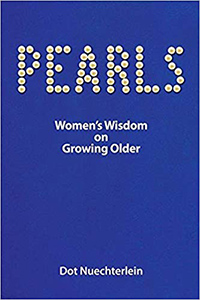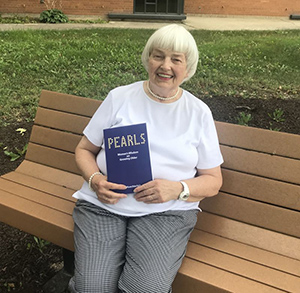In his 2004 book What are Old People For? geriatrician William H. Thomas, who spent a number of years as a medical director of a nursing home where he had many opportunities to observe and interact with elders, wrote about the change in consciousness of time as people grew older. Children, he said, are masters of being—they enjoy activity, but it is often a part of make-believe. “What children do while they are playing is secondary to what they can be while they are playing.” Adolescence is a time of transition into the adult practice of doing—the world of “tasks and schedules, payments, obligations, and jobs that need to be done.” Adults may sometimes play and just be, but the emphasis is on achievement. And many adults, he says, think everyone should stay in that frame of reference no matter how long they live; they have the subconscious notion that there is unlimited time in which to do, to get, and to have.

However, Thomas suggests that senescence, the process of becoming older, is a time of transition, similar to adolescence except in reverse: the person in later years is gradually letting go of “have to” in favor of “want to,” from doing back to an emphasis on being. The view of time changes as she or he realizes that time is relative, not endless; considering past, present, and future helps them understand the meaning of the lives they have lived. This is a process, not the same for everyone, yet at some point many older people would echo Dr. Seuss when he complained, “How did it get so late so soon?”
Some of those views are evident in responses to the survey question, “What has changed in the way you deal with time?”
I love Time. This is the first time in my life that I am not constantly “doing.” I can sleep in…watch TV without guilt, enjoy long phone conversations. If I’m tired, I just putz around the house and then rest. Time is wonderful, but I am aware that there is less of it to enjoy, which makes it even sweeter. —Linda, Indiana
There is now time to do what I really want—like lunch with my husband or friends, caring for my grandson, just playing a game on the computer, or doing Sudoku. —Ruth, Indiana
I seem to be blessed with more time than I ever recall having before. I am quite good at finding projects for myself and love having time for those, but I do remember days when I longed for just twenty-four hours of totally unscheduled time. I love having time…to do something…or nothing. —Sandy, Indiana
Seems I cannot accomplish as much as I used to; plenty of rest and “letting things be” seems natural; I also make attempts to procrastinate less. —Dawn, Missouri
I miss the scheduling in my work life. —Carolyn, Illinois
Time is a gift I have been given since retiring. I pray every day that I will not waste it or misuse it. I still do think “I should be doing something,” so to sit in the middle of the day reading causes me some guilt. After all, my house always needs some attention. —KS, Indiana
Not much has changed—I’m busy as ever. Of course, the events I am busy with are different from when I was working. Can linger a bit longer in the mornings and that is wonderful. I can take time to take walks. I’m just now beginning to be able just to sit and look out the window enjoying the clouds, rain, or sunshine. —JMB, Indiana
I set priorities for getting things done. Being retired, I’m not constrained by job-related requirements. —CSP, Maryland
Time flies by—and that’s okay with me. —Marilyn, Washington
I am a better manager of time, do less fretting and just try to tackle things. I am less “perfectionist” and “good enough” is okay! —Jean, New York
I am more possessive of my time. —KG, Indiana
It is moving much too fast and I am moving slower. —MKL, Indiana
I think I have become more contemplative. I am not so concerned if I don’t “accomplish” a lot in one day. You might say I waste more time. —EKD, Kansas
I try to be conscious of using my time wisely, doing things I enjoy with my time, and enjoying the people I love. —MB, Indiana
It is very important to accomplish what I can when I have the time/desire/ability, as tomorrow is an unknown. I have stopped thinking “I should really call… I should really send a note…” and just do it. —Jo Ann, Indiana
I think I let myself be more present than I used to—time seems to slip away so fast as you get older. Developing some appreciation for the day helps me slow time down a little. —Debbie, Indiana
I’ve never been too concerned about time—spent years in the Philippines where transportation and weather cause delays. I continue to start out when I should already be someplace… I don’t make excuses, I just come late. —BJB, Indiana
As I get older, I feel I need to do a lot of things I want to experience in a shorter amount of time. In everyday living, I try to stretch the day out as long as possible—to enjoy happy things and some solitude. —Stephanie, Indiana
I realize how short time is and how uncertain the future is in the way of doing earthly endeavors. Much of the time is spent in prayer, for faith for myself, for family, for courage, for the ability to make the right choices, for friends. —KSE, California
When we first retired I felt as if we finally had all the time and money we needed. However, as the end has come so quickly to the lives of many of my friends, I realize that we never have all the time we need. Now I never say, “I’ll do that later.” I may not have a later. Who knew that I would conquer procrastination at this point in my life. —Sandy, Florida

Dot Nuechterlein, former Cresset monthly columnist (The Last Word, 1983-’89), is a retired lecturer in sociology and criminology. For more than three decades she taught courses in aging and women’s studies at Valparaiso University. Her recent book, of which this is an excerpt, includes responses from more than eighty women to questions about issues related to growing older. It is not, Dot says, a “how to grow older” manual, but “a sharing: ‘This is what it’s been like for us—how is it going for you, or for someone you care for?’”













